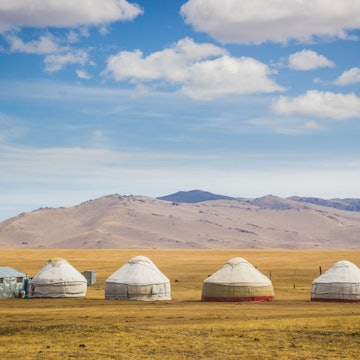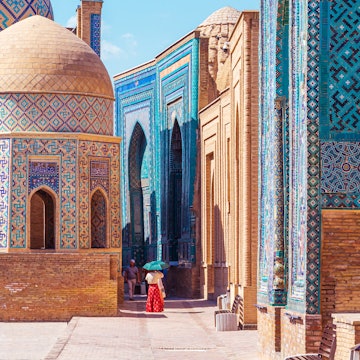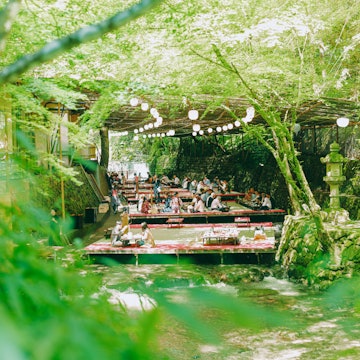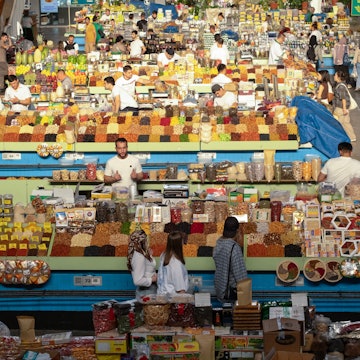
Uzbekistan vs Kyrgyzstan: which Central Asian country should you explore?


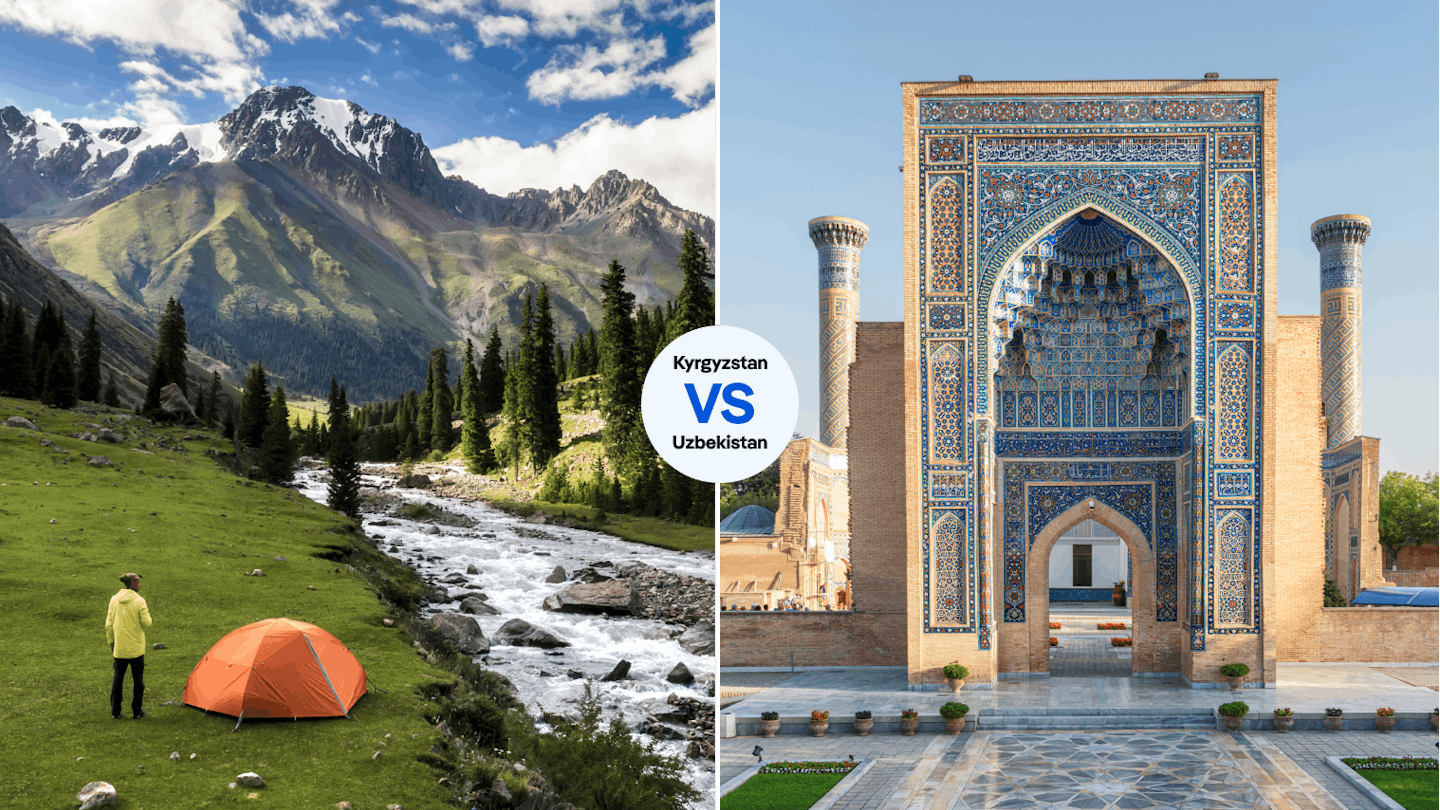
Planning a trip to Central Asia? Choose between Uzbekistan and Kyrgyzstan with this guide © Anton Petrus / Getty Images; iStock
Central Asia encapsulates the romance of the Silk Road.
Uzbekistan is home to ancient cities and mindboggling architecture, while Kyrgyzstan has unspoiled natural beauty at every turn. It also offers visa-free travel for most nationalities, making it a popular gateway for many travelers coming to Central Asia.
Hopefully you're able to make room for both of these incredible countries on your agenda, but if time is tight and you can only pick one, bad luck, you have a tough decision to make. To help you narrow down your options, we asked two travel writers to go head-to-head, giving the case for the destination closest to their hearts.

Uzbekistan is a spellbinding medieval capsule
Anna Kamiski is a travel writer and guidebook writer.
Have you ever strolled through Khiva’s exquisitely preserved walled city of Ichon-Qala at dawn on a cold spring morning, with ice crystals glinting off the turquoise-tiled Kalta Minor minaret, and the rays of the rising sun illuminating the roofs of the many mosques and mausolea? Have you ever peeked inside the sublime courtyard of the Pahlavon Mahmud Mausoleum, where the legendary poet, philosopher and wrestler is seeing out eternity, or marvelled, slack-jawed, at the intricate tilework of the Tosh-Hovli Palace, or the tiled portico of Kuhna Ark? Have you scaled the watchtower of Kuhna Ark at sunset, or wandered Ichon-Qala’s labyrinthine lanes on a breathless summer night? If so, then you know what it’s like to be utterly spellbound by this medieval time capsule, what it feels like to be the only person there, and to be privileged to be drinking in all this grandeur for the first time.
Yes, Uzbekistan is perhaps the most well-trodden of all the ‘Stans, but rightly so. No other country in Central Asia can match its history as the epicenter of the Silk Road that stretches back millennia, or its embarrassment of riches when it comes to show-stopping architecture.

My love affair with Uzbekistan began a decade ago, when on a whim I took a train from Kazakhstan to Tashkent, and immediately ran afoul of the law. I had a stack of Uzbek som (local currency) in my possession, and would have been in trouble if the border guards found it, since it’s not supposed to be taken out of Uzbekistan. Luckily, the three cheerful Uzbek women with whom I was sharing my train carriage came to my rescue. “Just stuff it down your bra”, I was told. While I was patting my now-rectangular bosom, cheerful, matronly Gulnora invited me to her daughter’s wedding in the Fergana Valley. Not one to pass up a chance for adventure, I took her up on what turned out to be typical Uzbek hospitality: I was put up on her cousin’s son’s floor and stuffed with plov, shashlik and manti (steamed dumplings) during the course of the festivities until I could barely move. Gulnora’s cousin Ya’kub took it upon himself to show me around the Fergana Valley’s legendary bazaars – all clamor and color and delicious scents – and proudly showed off the family-run workshop in Margilon where his wife carried on the centuries-old tradition of spinning silk and weaving it into beautifully-patterned ikat. While Kyrgyzstan has also been touched in centuries past by branches of the Silk Road, Uzbekistan is by far the biggest, most impressive manifestation of this mythical, age-old trade route used by the Greeks, Persians and the Chinese as early as the 2nd century BCE, that still exists in some form today.
I then experienced the same cheerful hospitality in the Chimgan mountains, within easy reach of Tashkent. Sure, Kyrgystan’s mountains may be taller, their needle-like peaks wonderfully photogenic, but Chimgan’s roaring glacial rivers and snow-capped crags are no less beautiful, while Nuratau’s rolling hills and tiny villages nestling beneath pistachio tree in river valleys offer endless hiking adventures combined with a genuine opportunity to get to know local families as you stay in their spare rooms.

Moving on to the key Silk Road city of Samarkand, I marveled at the azure mosaics and imposing medressas (religious schools) flanking the plaza of Registan, the commercial heart of medieval Samarkand. I was traveling in my father’s footsteps, who came here as a penniless Soviet student in the 1960s and was similarly impressed. Bukhara’s centuries-old medressas, mosques and lively domed bazaars were equally bewitching before a train whisked me off across the Kyzylkum Desert to Kniva, and then onwards to Nukus, the capital of the autonomous Karakalpakstan region with an unparalleled collection of Soviet art in its Savitsky Museum.
Kyrgyzstan may have glacial lakes and alpine meadows galore, yet it’s missing Uzbekistan’s magic: as you look out of the train window at the sand dunes, you can almost see the mythical Silk Road caravans of heavily laden camels come into view like some fata morgana. Finally, the retreating Aral Sea – the result of diverted rivers and unsustainable cotton production – and the rusted ships stranded in the desert near Moynaq offer a sobering lesson in Soviet hubris, and sum up Uzbekistan’s beauty and tragedy like nothing else.

Visit Kyrgyzstan for unique landscapes and nomadic culture
Based in Kyrgyzstan for nearly a decade, Lonely Planet author Stephen Lioy enjoys carrying heavy camera gear to high mountain passes then cadging fermented horse milk off unsuspecting shepherds on the way down.
Somewhere in the mountains south of Issyk-Köl on the way up yet another 1000m (3280ft) climb it hits you – no, not altitude sickness, but the realization that you’ve not seen another tourist in several hours. What in more popular destinations might signal you’ve hopelessly lost the way in Kyrgyzstan just means you’re on yet another lightly-used Tien Shan trekking route – and there are plenty of those to choose from.
Indeed, the Kyrgyz Republic can proudly claim to sit at an intersection of nomadic culture and high mountain landscapes matched nowhere else in Central Asia – perhaps nowhere else in the world. Drive up to Son Kol or trek to the shore of Ala-Köl lake – both above 3000m (9843ft). Walk along the 60km-long (37-mile) Inylcheck Glacier – crossing on and off the ice on a trail that changes through the season as the glacier moves. Freeride untouched backcountry powder at Jyrgalan or Too-Ashuu. Each evening, bed down in a warm yurt after a filling meal of meat- and carb-dense laghman noodles or gulchetai soup; after all, if it’s enough to fuel a shepherd through the summer it’ll certainly keep you on the trail.
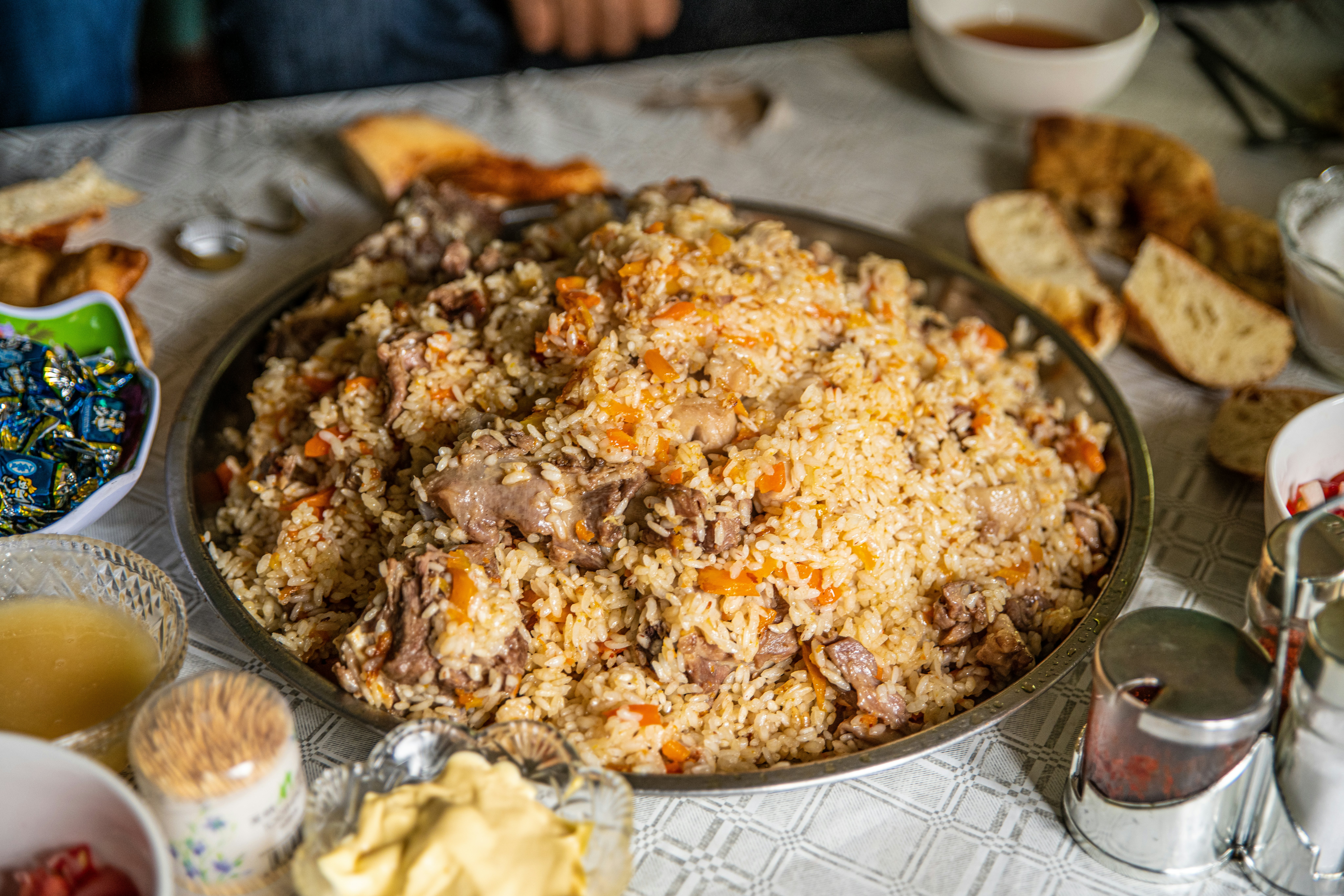
Travelers to Uzbekistan might tell you to visit there for the food – and they’re not wrong! But what they won’t tell you is that you’ll find plov, samsa, and shashlik in Osh that are every bit as tasty (and often at a fraction of the price); as well as cuisines from the 80+ other nationalities that call Kyrgyzstan home. Karakol city itself is home to at least ten distinct cultural groups, with many of these offering family-hosted dinners or cooking classes to share their cuisines and traditions with travelers.
While admittedly both countries produce beautiful handicrafts, I’m particularly partial to Kyrgyzstan: intricate leather goods and felt handicrafts that, unlike porcelain, fold up nicely in your luggage and wont break on the trip back home.

Kyrgyzstan’s historic buildings at Burana, Uzgen, and Tash Rabat might not match the visual impact of Uzbekistan’s Silk Road cities (largely reconstructed since Soviet times, I might add…). However, they can brag of being situated amidst a mountain backdrop so stunning that even the long-nomadic Kyrgyz tribes arrived after migrating thousands of miles from Siberia’s Yenesi region and said to themselves: this place is just too beautiful to move on from.
Even these well-traveled nomads were struck by the majesty of nature and the diversity of wildlife here – leaving their literal mark in petroglyph sites across the country. Carvings range from Tibetan-Buddhist inscriptions (Silk Road influence, what can I say) and figures of daily life on the shores of Issyk-Köl to the more than 100,000 religious and hunting scenes scattered across one valley of carved rocks in Jalalabad’s Saimaluu Tash – including a handful of salacious scenes, if you can find them! You won’t leave your own mark here, naturally, but you will leave with these images indelibly carved into your memory (and your memory cards).

On top of all that: Kyrgyzstan wants you to come! While many passports can visit both countries visa-free, Kyrgyzstan further extends that privilege to travelers from the United States, most of the Gulf countries, Bosnia and Herzegovina, Moldova, and a handful of others that don’t make the corresponding list. Even if you do need a visa, Kyrgyzstan’s e-Visa portal works quickly and reliably – how much patience do you really have to try endlessly resizing a passport photo, after all?





